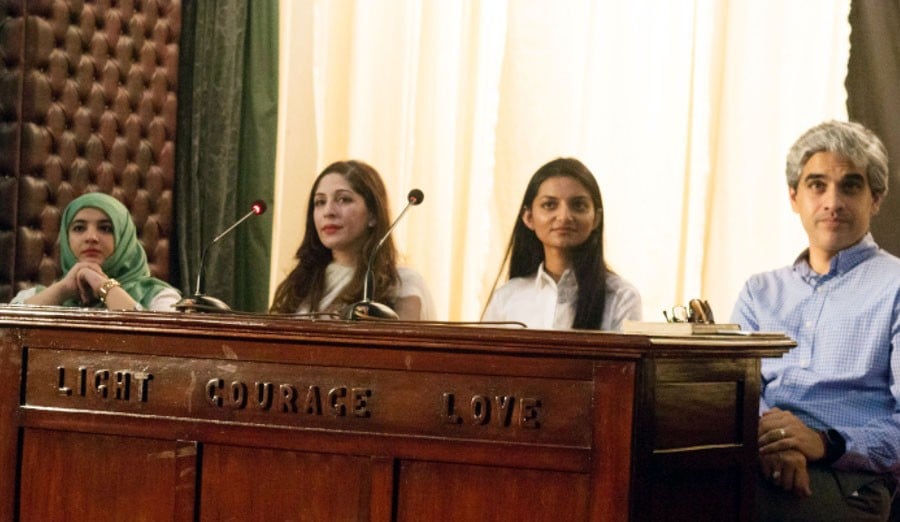
A panel discussion at KC sought to define the role of literature and performing arts in creating empathy

Kinnaird College for Women’s English Magazine Society (EMS) recently organised a panel discussion on the role of literature and performing arts in creating empathy and social awareness.
The moderator for the daylong interactive discussion was Tanzila Khan, the well-known youth activist and author of A Story of Mexico and The Perfect Situation: Sweet Sixteen. The young lady, who has proved that it is possible to rise above your ‘disabilities,’ is also a motivational speaker and trainer of soft skills for corporate sector.
The panelists included actor Omair Rana, who also runs his theatre company by the name of Real Entertainment Productions. Besides, he teaches drama at a school in Lahore. Sidra Fatima Sheikh and Shanzae Shahid were the other two speakers for the day. Sheikh is a lawyer by profession and also a member of the managing committee of Gulab Devi Trust Hospital. Her first novel, The Blue Jumper, said to be a sci-fi comedy, was published in June this year. Shahid is a rare 21-year-old whose fourth novel recently came out.
The house opened with questions regarding ‘why they do what they do.’ Each panel member related fairly candidly whatever had led them to pursue their respective jobs/careers.
"You have to write for yourself," Sheikh said. She urged those wishing to write to "become disciplined. We can all take out 10 minutes from our daily routines to write or at least think about what we want to write. This is how I first began [in writing]."
Rana was of the view that his "work gives me a certain level of power and security. I might be so very different from the Pashtun man I’ve played on screen but this is where the idea of empathy comes in. Had I not been able to understand why some random person is the way he is, I would not have convinced my audiences of the character’s authenticity."
Elaborating on his point, Rana said that shallow analysis of a character on paper can never be enough for an actor to become that character; you have to empathise with the human sensibilities of that character. "It is this ability to get into the mind of another person and try and see things through their eyes which makes us human."
Shanzae Shahid also joined in the discussion, and said that all "fiction stems from reality. It is when the creative imagination takes over that we get a story out."
She went on to explain how most fictional stories have a certain truth to them which is universal in nature -- be it the story of Romeo-Juliet and Heer-Ranjha, or that of Cinderella whose good triumphs over her evil step-mother and sisters. "How come the readers are able to identify themselves with these characters? It is through empathy."
In her concluding remarks, Dr Rukhsana David, Principal, KC, said, "We must reflect, reflect, reflect!" The session was engaging enough for the audience which comprised students and faculty members, to ensure that no one left the venue in the middle.